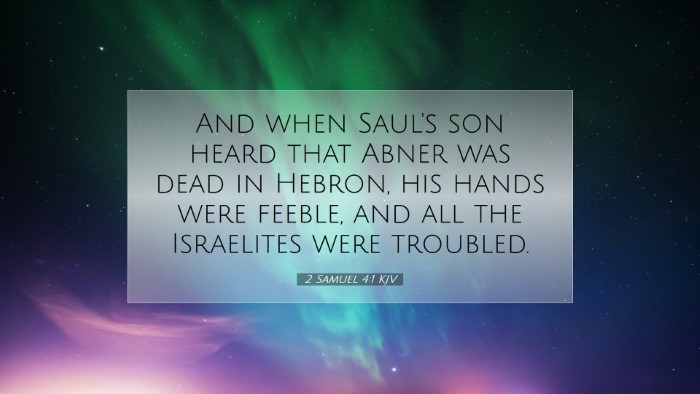Old Testament
Genesis Exodus Leviticus Numbers Deuteronomy Joshua Judges Ruth 1 Samuel 2 Samuel 1 Kings 2 Kings 1 Chronicles 2 Chronicles Ezra Nehemiah Esther Job Psalms Proverbs Ecclesiastes Song of Solomon Isaiah Jeremiah Lamentations Ezekiel Daniel Hosea Joel Amos Obadiah Jonah Micah Nahum Habakkuk Zephaniah Haggai Zechariah Malachi2 Samuel 4:1
2 Samuel 4:1 KJV
And when Saul's son heard that Abner was dead in Hebron, his hands were feeble, and all the Israelites were troubled.
2 Samuel 4:1 Bible Commentary
Commentary on 2 Samuel 4:1
Bible Verse: 2 Samuel 4:1 - "When Saul's son heard that Abner was dead in Hebron, his hands were feeble, and all the Israelites were troubled."
Contextual Background
This verse occurs during a tumultuous period in Israel's history, shortly after the death of Saul and the ensuing power struggles. Abner, the commander of Saul's army, was a pivotal figure, and his death marks a significant turning point in the narrative, influencing the political landscape and the fate of Saul's remaining son, Ishbosheth.
The tension highlighted in this passage is not merely political; it embodies the broader themes of loyalty, betrayal, and the fragility of human power in the face of divine sovereignty.
Insights from Matthew Henry
Matthew Henry provides a comprehensive examination of this verse, emphasizing the psychological state of Ishbosheth upon hearing of Abner's death. His fear and the weakening of his resolve signify the collapse of his already tenuous hold on power.
- Abner's Leadership: Henry notes that Abner's death left a vacuum of leadership within Israel, causing immediate distress among the people.
- Feebleness of Leadership: The phrase "his hands were feeble" illustrates Ishbosheth's lack of strength or courage. Henry points out that this tremor reflects not just physical weakness but a moral disarray, throwing the entire nation into uncertainty.
- Public Reaction: His commentary underscores that the disturbance among the Israelites was not merely a reaction to fear of the political ramifications but also a reflection of their loyalty to Saul’s house.
Insights from Albert Barnes
Albert Barnes offers a historical perspective on this passage, examining the ramifications of Abner’s death and how it affects Ishbosheth. Barnes expounds on the significance of Abner's role as a stabilizer for the fractured kingdom.
- Political Instability: Barnes argues that the event catalyzes a shift in power dynamics, making it clear that the absence of strong leadership leads to chaos.
- Ishbosheth's Reaction: He adds depth by explaining Ishbosheth's fear was partly due to the realization that Abner, who had once supported him, was no longer there to provide protection.
- Divine Judgment: Barnes suggests that this situation serves as an illustration of God's providential control, where divine sovereignty overshadows human plots.
Insights from Adam Clarke
Adam Clarke contributes a theological perspective that emphasizes the moral implications of Ishbosheth’s actions and the broader themes of divine justice and leadership.
- Moral Weakness: Clarke reflects on how Ishbosheth’s lack of will represents a moral crisis, suggesting leaders should have resolve amidst adversity. His instability epitomizes the condition of Israel, reliant on human strength rather than divine providence.
- Consequences of Leadership: Clarke mentions that a leader’s ability to command loyalty and respect is crucial; without it, the community experiences turmoil.
- Significance of Abner's Death: He highlights that this moment encapsulates the judgment of God upon Saul’s lineage, demonstrating that earthly power structures can swiftly collapse.
Theological Reflections
As we synthesize these insights, several key themes emerge, relevant for pastors, students, theologians, and Bible scholars:
- Leadership and Responsibility: The passage underscores the weight of leadership. For those in positions of influence, it is a reminder that strength must be drawn from a deeper source than mere human capability.
- Human Versus Divine Authority: The feebleness of Ishbosheth highlights the contrast between human frailty and the overarching authority of God. This can serve as a profound lesson about the ultimate sovereignty of God over the affairs of nations and individuals.
- Community and Loyalty: The anxiety of the Israelites illustrates the importance of unity and loyalty in times of leadership change. Identity is often caught up in relationships and historical ties, reinforcing that a community’s strength lies in its shared resolve.
- Hope Amidst Despair: While the passage presents a dark moment for Ishbosheth and Israel, it is also an opportunity to reflect on the way God establishes His chosen leaders, leading us toward the future promise found in King David.
Conclusion
In conclusion, 2 Samuel 4:1 invites a multifaceted examination of leadership, fear, and divine providence. By gleaning insights from Matthew Henry, Albert Barnes, and Adam Clarke, we gain a richer understanding of both the historical narrative and the timeless truths that resonate for all who seek to understand the intricacies of God’s sovereign plan in human history.
This commentary encourages readers to reflect on their own leadership roles and the source of their strength, the importance of community bonds, and the greater divine narrative at work in the midst of chaos.


